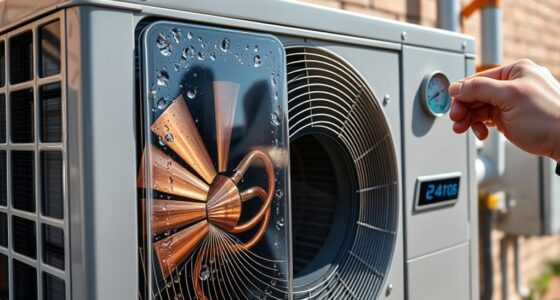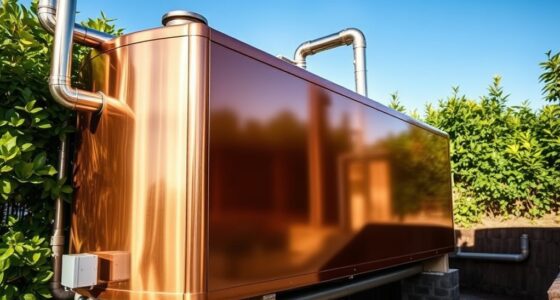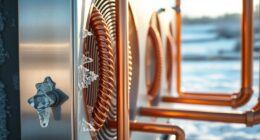We’ve all experienced it – enduring the sweltering heat of summer, fervently wishing for a refreshing haven in our living spaces. This is precisely when choosing the ideal air conditioning heat pump becomes crucial.
In this article, we’ll simplify the process for you, providing key factors to consider, tips for sizing, and information on energy efficiency and advanced features.
With our guidance, you’ll be able to find a quiet, reliable, and efficient air conditioning heat pump that will keep you comfortable all year round.
Key Takeaways
- Heat pumps provide both cooling and heating capabilities.
- Sizing considerations are crucial for effective cooling or heating.
- ENERGY STAR labeled models provide optimal performance and lower energy bills.
- SEER ratings indicate the energy efficiency of the heat pump.
Understanding Air Conditioning Heat Pumps
We’ll now explore how air conditioning heat pumps work. Understanding heat pump operation is essential for anyone seeking to benefit from heat pump technology.
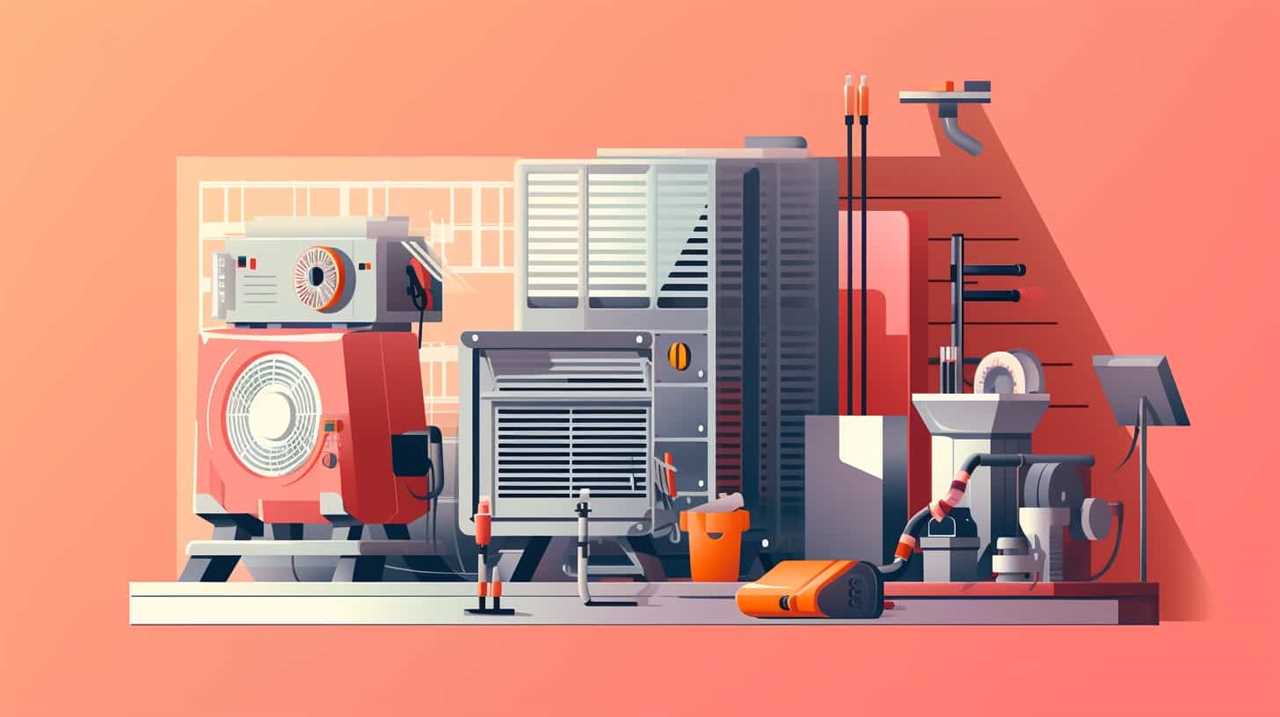
Heat pumps are highly efficient devices that transfer heat from one area to another, providing both cooling and heating capabilities. They work by utilizing a refrigerant to absorb heat from the surrounding air or ground and then transferring it to the desired space.
This process is achieved through the use of a compressor, condenser, expansion valve, and evaporator.
The benefits of heat pump technology are numerous. Not only do they provide energy-efficient heating and cooling, but they also offer improved indoor air quality and reduced environmental impact.
Key Factors to Consider When Choosing an Air Conditioning Heat Pump
When selecting an air conditioning heat pump, there are several key factors to consider in order to make the best choice for our needs.

Two important factors to consider are sizing considerations and energy efficiency. Sizing considerations refer to the capacity of the heat pump, which is determined by the size of the space it will be used to cool or heat. It’s essential to choose a heat pump that’s the right size for the area, as an undersized unit will struggle to cool or heat the space effectively, while an oversized unit will waste energy and lead to higher utility bills.
Energy efficiency is another crucial factor to consider, as it directly impacts the operating costs of the heat pump. Look for models with high energy efficiency ratings, such as those with the ENERGY STAR label. These models are designed to provide optimal performance while consuming less energy, resulting in lower energy bills.
Considering both sizing considerations and energy efficiency will ensure that we select an air conditioning heat pump that meets our needs while operating efficiently.
Now let’s move on to the next section where we’ll discuss how to size your air conditioning heat pump and get the right capacity.

Sizing Your Air Conditioning Heat Pump: Getting the Right Capacity
When it comes to selecting the right capacity for your air conditioning heat pump, we need to focus on three key points: calculating the heat pump capacity, considering factors that affect sizing, and finding the balance between efficiency and oversizing.
Calculating the heat pump capacity involves determining the amount of cooling and heating needed for your space.
Factors such as insulation, climate, and room size affect the sizing process, and it’s important to strike a balance between a system that’s efficient and one that isn’t oversized.
Calculating Heat Pump Capacity
To accurately size your air conditioning heat pump, we need to calculate its capacity by considering factors such as the size of the space and the climate conditions. Calculating the heating capacity of a heat pump is crucial to ensure that it can effectively and efficiently maintain the desired temperature in your home or office.

Here are four factors to consider when calculating heat pump capacity:
-
Size of the space: The square footage of the area you want to heat or cool plays a significant role in determining the capacity of the heat pump. Larger spaces require higher capacity heat pumps to adequately distribute the air.
-
Climate conditions: The climate in your location affects the heat pump’s efficiency. Colder climates require heat pumps with higher heating capacity to combat the lower temperatures.
-
Insulation: The level of insulation in your space affects the heat pump’s performance. Well-insulated areas require less heating capacity compared to poorly-insulated spaces.

-
Occupancy: The number of occupants in the space also influences the heat pump capacity needed. Higher occupancy may require a larger heat pump to maintain a comfortable environment.
Considering these factors will help you accurately calculate the heating capacity required for your air conditioning heat pump, ensuring optimal performance and energy efficiency.
Factors Affecting Sizing
For accurate sizing of our air conditioning heat pump and obtaining the right capacity, we need to consider factors such as the size of the space and the climate conditions. These factors play a crucial role in determining the appropriate size of the heat pump needed for optimal performance and energy efficiency.
When it comes to sizing your air conditioning heat pump, there are several factors to consider. First, the size of the space you want to cool or heat is essential. A larger space will require a larger capacity heat pump to effectively maintain the desired temperature. On the other hand, a smaller space may only need a smaller capacity heat pump.
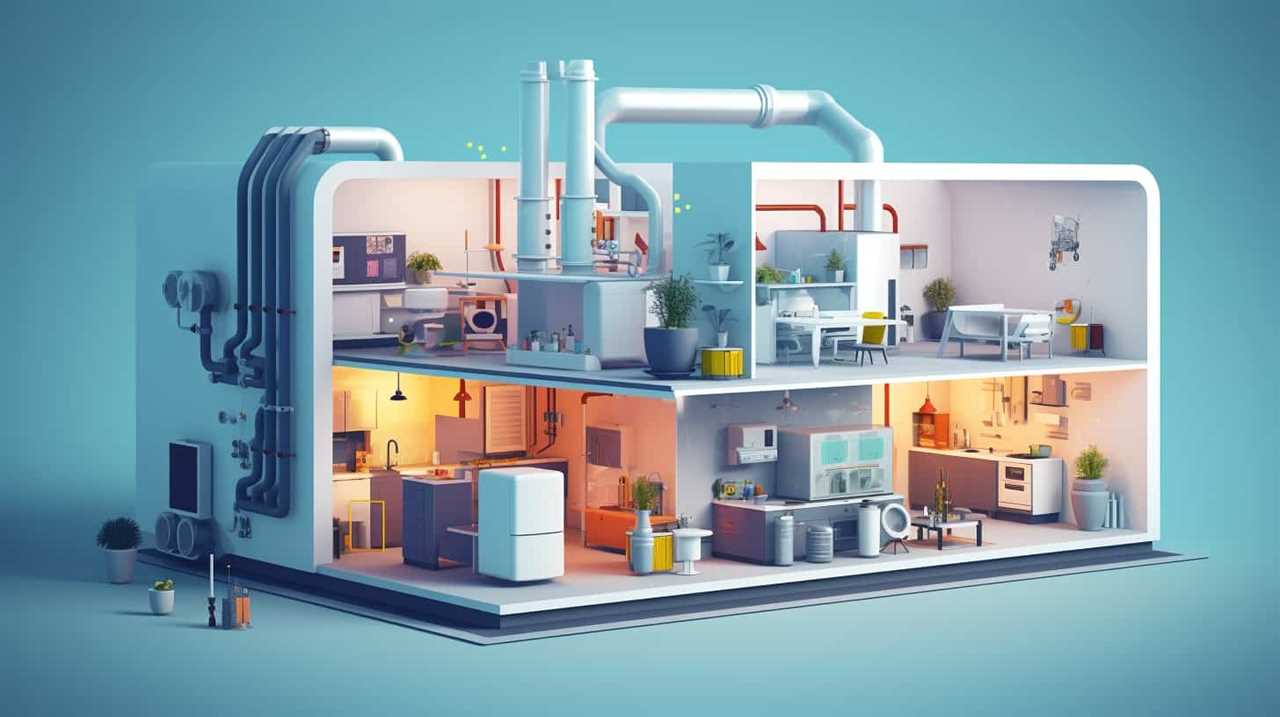
Climate conditions also play a significant role in sizing your air conditioning heat pump. If you live in a region with extreme temperatures, such as very hot summers or cold winters, you may need a heat pump with a higher capacity to ensure sufficient heating or cooling.
It is important to avoid common sizing mistakes, such as undersizing or oversizing your heat pump. Undersizing can lead to inadequate cooling or heating, while oversizing can result in inefficient operation and increased energy consumption.
Efficiency Vs. Oversizing
How can we strike the right balance between efficiency and oversizing when sizing our air conditioning heat pump? It’s important to consider both efficiency and cost when selecting the right capacity for your air conditioning heat pump. Here are four key factors to keep in mind:
-
Efficiency vs. Cost: While a larger capacity unit may seem more efficient, it can also be more expensive to purchase and operate. It’s important to find a balance between efficiency and cost that suits your needs.

-
Proper Sizing: Oversizing your air conditioning heat pump can lead to inefficiencies and increased energy consumption. Undersizing, on the other hand, can result in inadequate cooling or heating. Proper sizing ensures optimal performance and energy efficiency.
-
Load Calculation: Conducting a load calculation is crucial for determining the correct capacity of your air conditioning heat pump. This calculation takes into account factors such as the size of your space, insulation, and climate to determine the appropriate size.
-
Professional Assistance: Seeking the help of a professional HVAC technician can ensure accurate load calculations and proper sizing. They have the expertise to assess your needs and recommend the right size air conditioning heat pump for your space.
By considering efficiency, cost, proper sizing, and seeking professional assistance, you can strike the right balance and optimize the performance of your air conditioning heat pump.
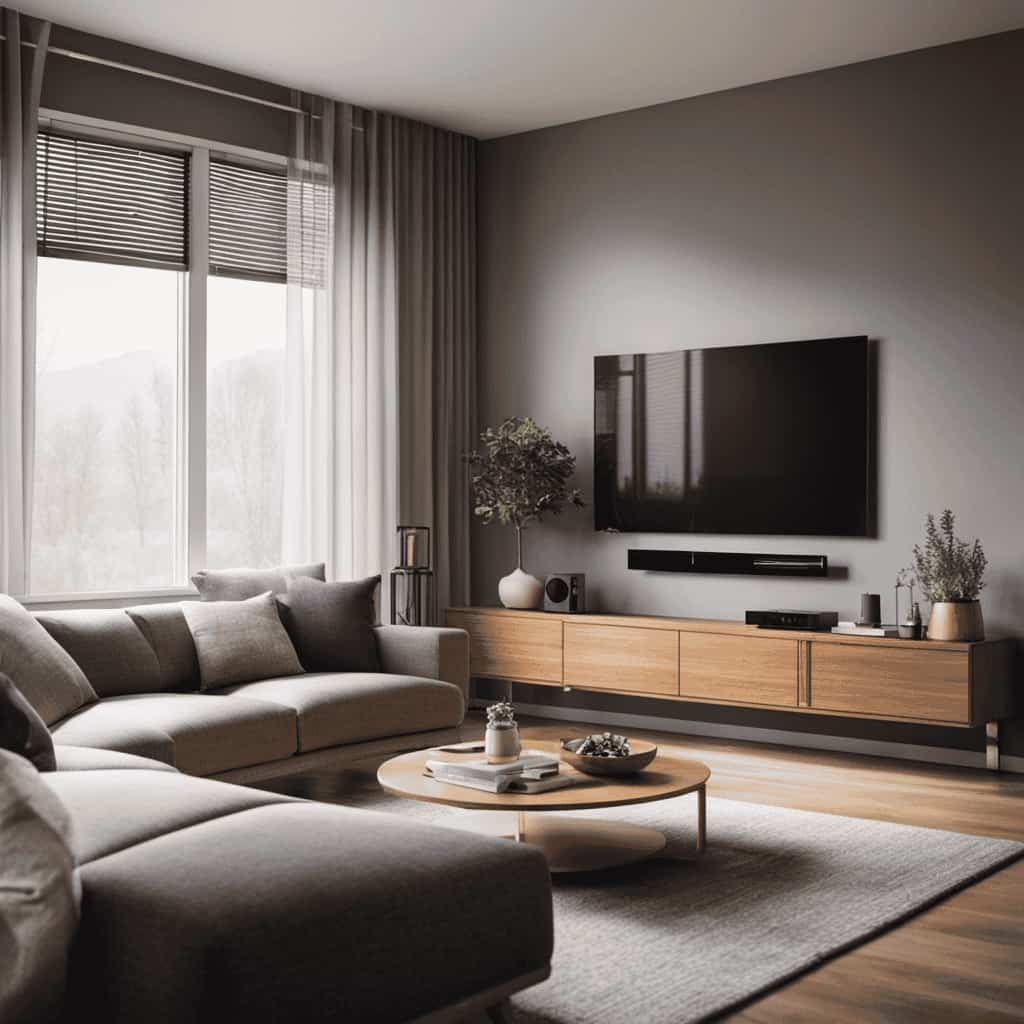
When it comes to energy efficiency, finding an air conditioning heat pump with high SEER ratings can further enhance the efficiency and performance of your system.
Energy Efficiency: Finding an Air Conditioning Heat Pump With High SEER Ratings
We can find an air conditioning heat pump with high SEER ratings to ensure energy efficiency. SEER stands for Seasonal Energy Efficiency Ratio, which measures the cooling output of an air conditioning system over a typical cooling season divided by the energy it consumes. A higher SEER rating indicates greater energy efficiency. When selecting an air conditioning heat pump, it is important to consider the SEER rating to minimize energy consumption and reduce utility costs.
To help you understand the importance of SEER ratings in energy efficiency, we have provided a table below comparing different SEER ratings and their corresponding energy efficiency levels:
| SEER Rating | Energy Efficiency Level |
|---|---|
| 14-15 | Standard Efficiency |
| 16-18 | High Efficiency |
| 19-21 | Very High Efficiency |
| 22+ | Ultra High Efficiency |
Exploring Different Types of Air Conditioning Heat Pumps
When it comes to exploring different types of air conditioning heat pumps, there are several important factors to consider.
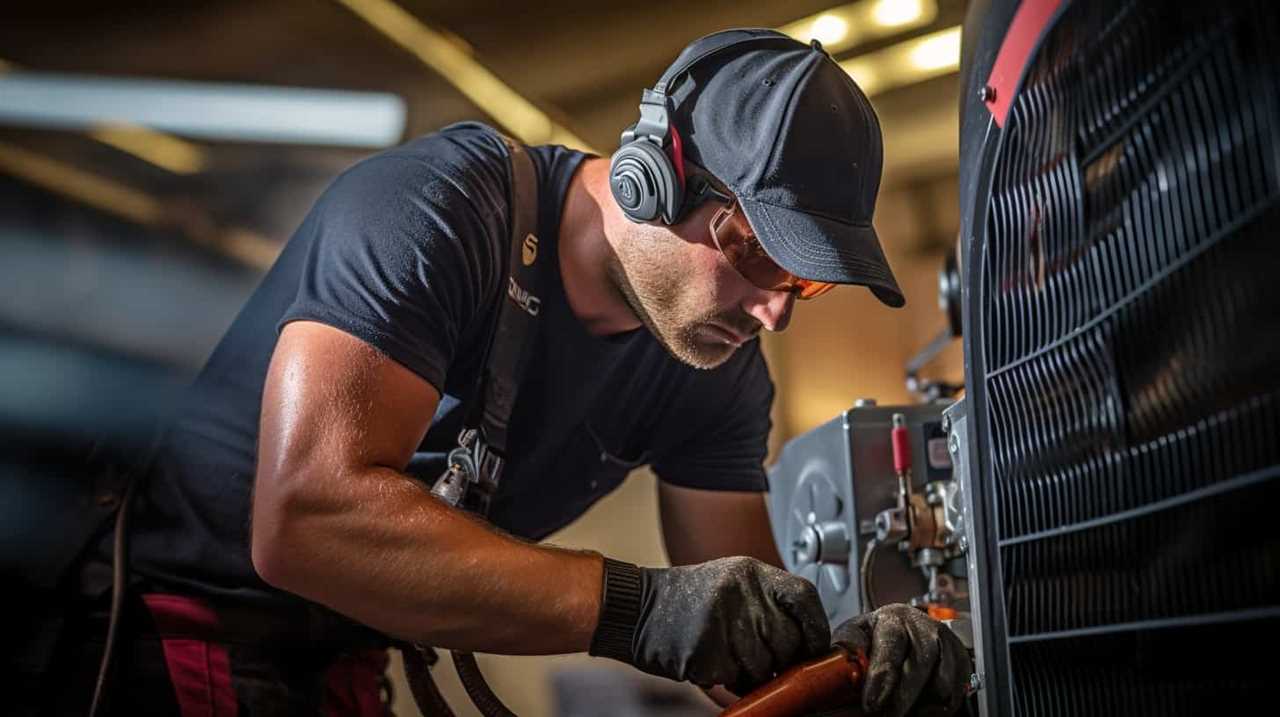
First, the efficiency of the heat pump is crucial in determining its performance and energy consumption.
Second, the size and compatibility of the heat pump with your home or building’s heating and cooling system must be carefully evaluated.
Lastly, cost and energy savings play a significant role in selecting the right heat pump for your needs.
Efficiency of Heat Pumps
There are three main types of air conditioning heat pumps that vary in efficiency. When considering the efficiency of a heat pump, it’s important to understand the different types available:

-
Standard Air Source Heat Pump: This type of heat pump is the most common and has a moderate level of efficiency. It’s suitable for most households and provides reliable heating and cooling.
-
High-Efficiency Air Source Heat Pump: This type of heat pump is designed to provide better energy efficiency compared to standard models. It uses advanced technology to maximize heating and cooling performance while minimizing energy consumption.
-
Geothermal Heat Pump: This type of heat pump is the most efficient option available. It utilizes the stable temperature of the earth to provide heating and cooling, resulting in significant energy savings over time.
Size and Compatibility
Finding the right size and compatible air conditioning heat pump is crucial for optimal performance and efficiency. When selecting an air conditioning heat pump, it is important to consider the size of the unit and its compatibility with your existing HVAC system. A heat pump that is too small will struggle to adequately cool or heat your space, leading to increased energy consumption and decreased comfort. On the other hand, a heat pump that is too large can cycle on and off frequently, resulting in inefficient operation and unnecessary wear and tear.

To help you understand the sizing and compatibility options available, here is a table outlining different types of air conditioning heat pumps:
| Heat Pump Type | Size Range | Compatibility |
|---|---|---|
| Split System | 1-5 tons | Compatible with most HVAC systems |
| Packaged Unit | 2-5 tons | Suitable for limited installation space |
| Ductless Mini-Split | 0.75-5 tons | Ideal for individual room cooling or heating |
Cost and Energy Savings
By comparing the cost and energy savings of different types of air conditioning heat pumps, we can make an informed decision for our specific needs. When conducting a cost analysis for air conditioning heat pumps, it’s important to consider the initial investment, as well as the long-term savings. Here are four key factors to consider in terms of cost and energy savings:
-
Energy Efficiency: Look for heat pumps with a high Seasonal Energy Efficiency Ratio (SEER) and Heating Seasonal Performance Factor (HSPF). These ratings indicate how efficiently the heat pump converts electricity into cooling or heating.
-
Maintenance Costs: Consider the cost of regular maintenance and potential repairs. Some heat pumps require more frequent maintenance or have higher repair costs.
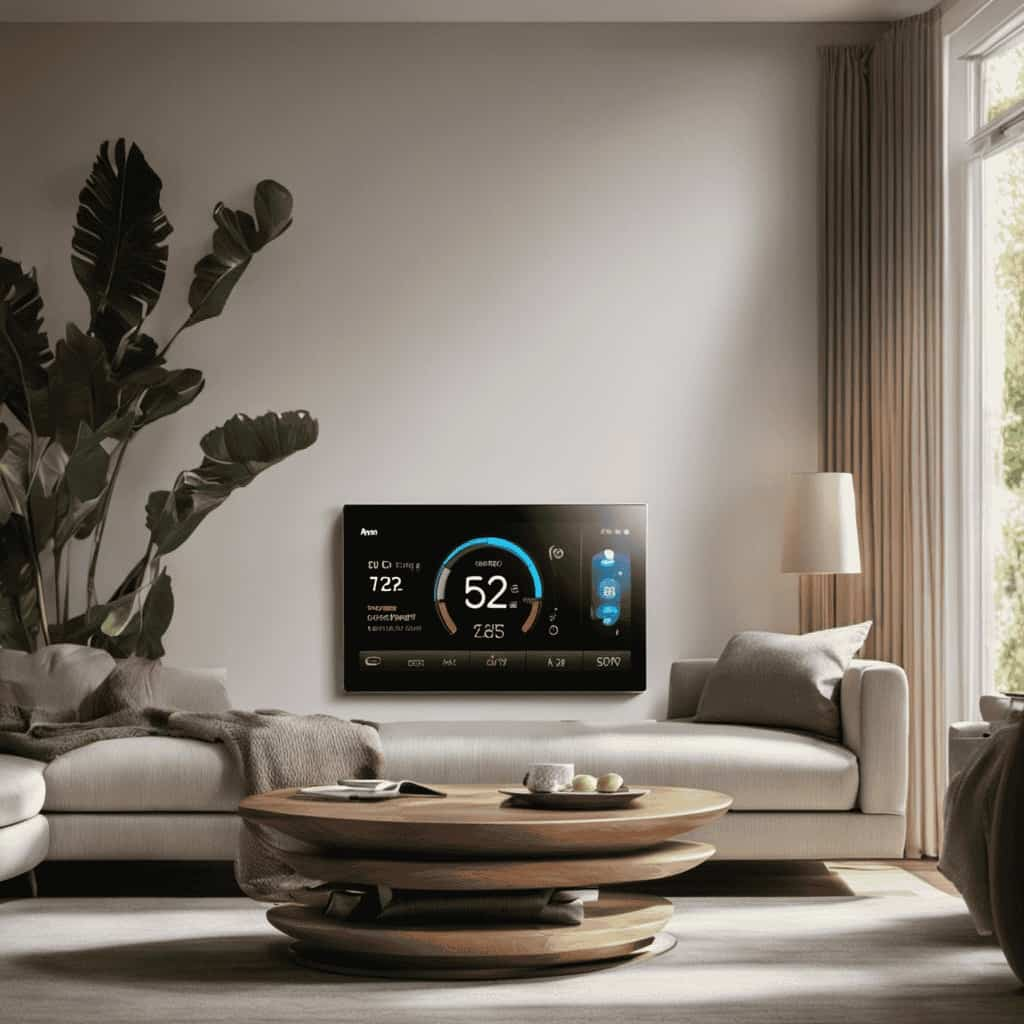
-
Operational Costs: Compare the energy consumption of different heat pumps. Look for models with energy-saving features like variable-speed compressors or smart thermostats.
-
Environmental Impact: Evaluate the environmental impact of different heat pumps. Consider factors such as refrigerant type, ozone depletion potential, and global warming potential.
Noise Levels: Selecting a Quiet Air Conditioning Heat Pump
We can ensure a peaceful environment in our homes by selecting an air conditioning heat pump with low noise levels. When choosing a quiet air conditioning heat pump, it is important to consider the decibel (dB) rating, which measures the sound intensity. Look for models with a dB rating below 60 for minimal noise disturbance. Additionally, some manufacturers provide information on the indoor and outdoor unit noise levels separately, allowing for more precise selection. If noise reduction is a top priority, soundproofing options can be considered. These may include installing additional insulation around the unit or using noise-dampening materials. By prioritizing quietness and exploring soundproofing options, we can create a more serene and comfortable living environment.
| Aspect | Quiet Model A | Quiet Model B | Quiet Model C |
|---|---|---|---|
| Indoor dB | 45 | 50 | 55 |
| Outdoor dB | 55 | 60 | 65 |
| Cost | \(\) | $$$ | $$ |
| Energy Efficiency | High | Medium | Low |
Advanced Features and Technology in Air Conditioning Heat Pumps
One important factor to consider when selecting an air conditioning heat pump is the advanced features and technology available in the market. Here are some of the advanced features and latest technology that you should look for:

-
Smart Thermostat Integration: Many air conditioning heat pumps now offer compatibility with smart thermostats, allowing you to control and monitor your cooling and heating settings remotely using your smartphone or other smart devices.
-
Energy Efficiency: Look for heat pumps that have high energy efficiency ratings, such as SEER (Seasonal Energy Efficiency Ratio) and HSPF (Heating Seasonal Performance Factor). These ratings indicate how efficiently the heat pump can cool and heat your space, helping you save on energy costs.
-
Variable Speed Compressor: Heat pumps with variable speed compressors can adjust their cooling and heating output based on the current demand, providing better comfort and energy savings.
-
Air Purification and Filtration: Some heat pumps come with advanced air purification and filtration systems, helping to remove allergens, pollutants, and odors from the air, ensuring cleaner and healthier indoor air quality.
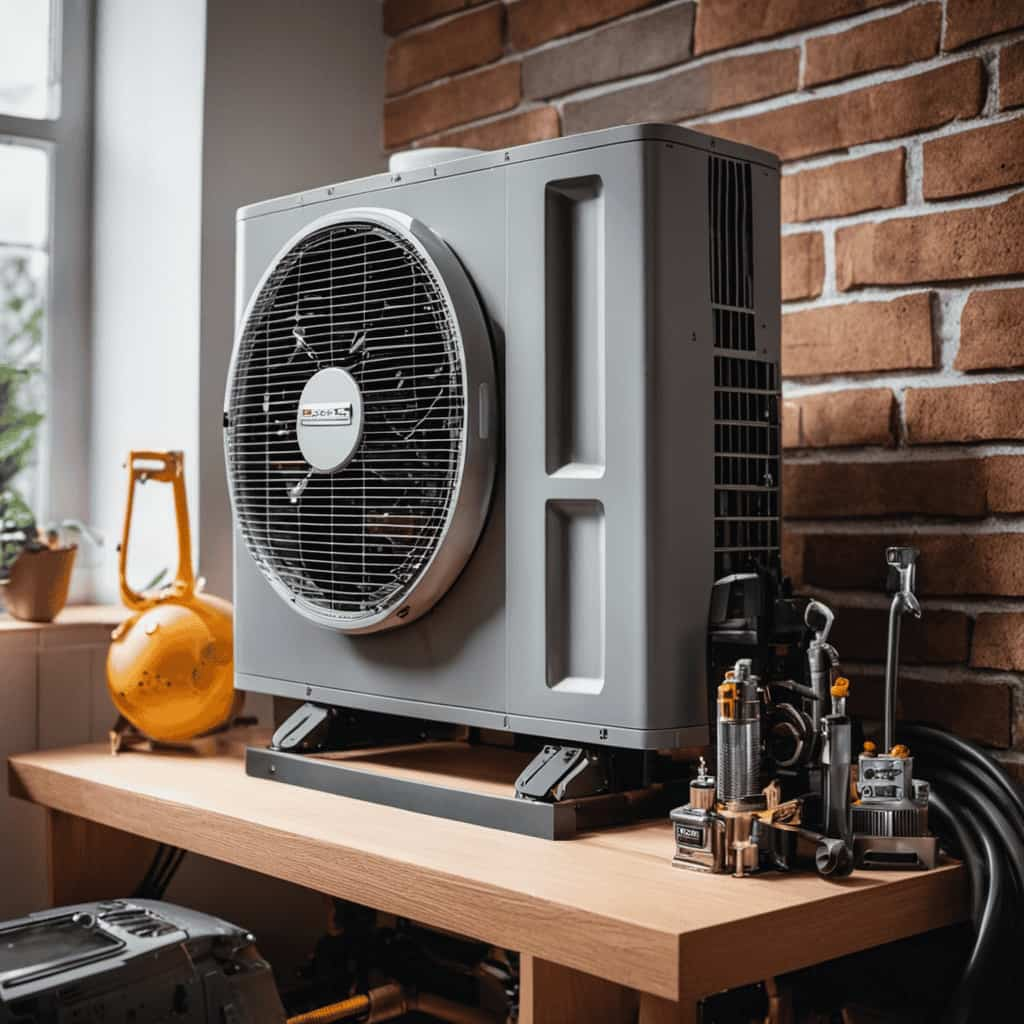
Maintenance and Service Requirements for Air Conditioning Heat Pumps
Regular maintenance and service are essential for air conditioning heat pumps to ensure optimal performance and longevity. By following a few maintenance tips and having a troubleshooting guide on hand, you can keep your air conditioning heat pump running smoothly and efficiently. Here are some key maintenance tasks to keep in mind:
| Maintenance Task | Frequency | Benefits |
|---|---|---|
| Clean or replace air filters | Every 1-3 months | Improves air quality and prevents clogging |
| Check and clean outdoor unit | Annually | Removes debris and ensures proper airflow |
| Inspect and clean coils | Annually | Enhances heat transfer and efficiency |
| Lubricate moving parts | Annually | Reduces friction and extends lifespan |
| Schedule professional maintenance | Annually | Identifies and resolves potential issues |
Regular maintenance not only improves the performance of your air conditioning heat pump but also reduces the risk of breakdowns. If you encounter any issues, consult a troubleshooting guide or contact a professional for assistance. By taking proper care of your air conditioning heat pump, you can enjoy cool comfort for years to come.
Frequently Asked Questions
Can an Air Conditioning Heat Pump Be Used in Extremely Cold Climates?
Yes, an air conditioning heat pump can be used in extremely cold climates. It’s important to consider the installation process and ensure energy efficiency in order to effectively heat the space.
What Are the Potential Health Benefits of Using an Air Conditioning Heat Pump?
Using an air conditioning heat pump can potentially provide health benefits, such as improved indoor air quality and better humidity control. Additionally, it offers potential energy savings and reduces the environmental impact compared to traditional heating and cooling systems.

Are There Any Government Incentives or Rebates Available for Purchasing an Energy-Efficient Air Conditioning Heat Pump?
Yes, there are government incentives and rebates available for purchasing an energy-efficient air conditioning heat pump. These incentives can help offset the cost of the unit and encourage energy savings.
How Long Is the Average Lifespan of an Air Conditioning Heat Pump?
The average lifespan of an air conditioning heat pump is typically around 15-20 years. It is important to consider energy efficiency when selecting a heat pump, as this can impact both lifespan and operating costs.
Can an Air Conditioning Heat Pump Be Used to Cool Multiple Rooms or Zones in a House?
Yes, an air conditioning heat pump can cool multiple rooms or zones in a house. It offers efficient cooling and requires proper installation to ensure optimal performance and comfort throughout the entire home.
Conclusion
In conclusion, when selecting an air conditioning heat pump, it’s important to consider key factors such as capacity, energy efficiency, noise levels, and advanced features.

One interesting statistic to consider is that air conditioning heat pumps with high SEER ratings can save up to 30% on energy costs compared to lower-rated models.
By choosing a heat pump with a high SEER rating, not only will you be saving money, but also reducing your carbon footprint and contributing to a more sustainable future.


